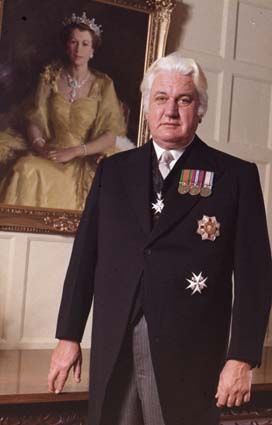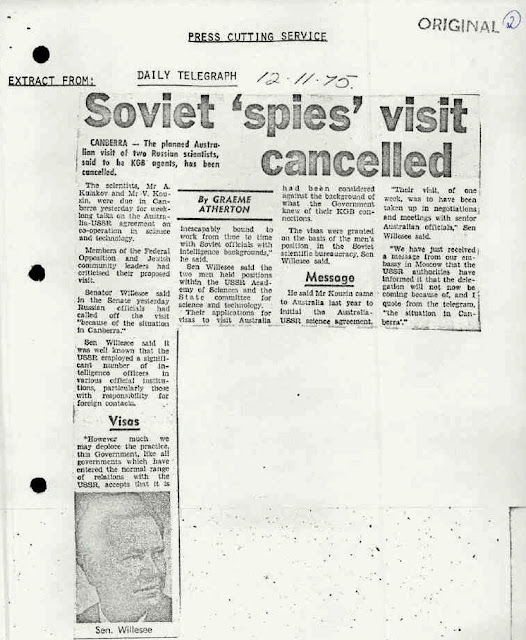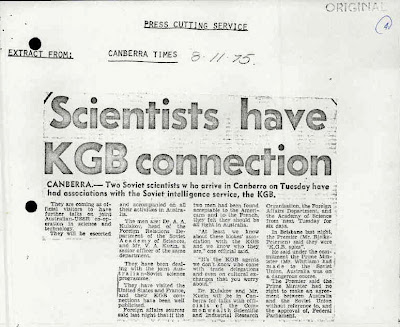-ASIO files reveal planned Soviet Spy visit
-TEAM UZUNOV joins the Jenny-Hocking-Dr Gerard Henderson fray over "The Third Man"
by Sasha Uzunov
At TEAM UZUNOV we regard it as our sacred duty to dispel or debunk myths and conspiracy theories, to shine a light into officially dark places but we are only human and sometimes we cannot resist the temptation to indulge in some wild speculation ourselves!
On Remembrance Day, 11 November 1975, the Governor General Sir John Kerr sacked the Labor (ALP) government of Prime Minister Gough Whitlam and plunged Australia into a constitutional crisis.
The Governor General is the Queen's representative to the Commonwealth of Australia and according to the Constitution is also Commander in Chief. The position is largely ceremonial but does have the power to sack governments. Prior to Whitlam, no Prime Minister had been dismissed in this manner.
Days before, a planned visit to Australia by Soviet spies undercover as scientists was cancelled when the media got hold of the story. Did this spook Sir John, (pictured left) a former Australian Army intelligence officer during World War II, into acting quicker on a decision already made up in his mind to sack Whitlam, a case of the straw that broke the camel's back in a long list of government gaffes, scandals and disasters?
The Whitlam Government did not have a good track record in dealing with intelligence services of any colour: the 1973 raid on the head quarters of the domestic spy service the Australian Security Intelligence Organisation (ASIO) by Attorney General Lionel Murphy, did a lot of damage to the Prime Minister:
Whitlam lamented "the greatest mistake the Government has made has been to take the (Commonwealth) police into ASIO HQ."
The lead up to The Dismissal, as the event is known in Australian history, was a political stalemate. The Whitlam Government (1972-75) did not have a majority in the Upper House, the Senate, and was blocked in passing money supply bills by the Opposition, the Liberal-Country Party coalition, headed by Malcolm Fraser. The government of the day is formed in the Lower House, the House of Representatives and needs a majority of seats to govern. However, it does not need a majority in the Senate but must have control of the money supply, which must gain approval from that chamber.
Sir John argued that he was compelled to break the impasse by sacking Whitlam and appointing Fraser as caretaker Prime Minister. At a federal election held after the dismissal, Fraser won in a landslide.
 All eyes and cameras on sacked Australian Prime Minister Gough Whitlam, 11 November 1975, Parliament House, Canberra.
All eyes and cameras on sacked Australian Prime Minister Gough Whitlam, 11 November 1975, Parliament House, Canberra.The controversy of The Dismissal still rages and was in the media spotlight recently about the involvement of a Third Man, High Court Judge Sir Anthony Mason. (Go to link- the Jenny Hocking-Gerard Henderson debate.)
Others, namely on the far Left, have gone so far to allege that the United States government, through the Central Intelligence Agency (CIA) was involved in bringing down Whitlam because of his opposition to American military installations, such as Pine Gap, on Australian soil.
The 4th of July 1975, Australian Prime Minister Gough Whitlam (centre) celebrates American Independence Day at a function with US Ambassador Marshall Green (right).
A gem unearthed by TEAM UZUNOV from the 1975 de-classified files of ASIO, lodged with the National Archives of Australia, reveals two Soviet intelligence officers (KGB), Aleksandr Kulakov and Vladimir Kuzin, posing as Scientists were granted visas for an Australian trip to study the Snowy Mountains Hydo-electric scheme and were due to arrive on 11 November 1975, the day of the sacking of Whitlam as it turns out but Moscow Centre aborted the mission because of the intense media scrutiny.
The photo of the Soviet KGB intelligence officers, contained in an ASIO file. Source: National Archives of Australia, title: ASIO document: A cancelled visit re Vladimir Andrianovich Kuzin, 1975, Series no: 12389, A48. Item barcode: 4725019. De-classified: 9 December 2008.
The headlines of the day--press clippings in the ASIO file. Source: National Archives of Australia, title: ASIO document: A cancelled visit re Vladimir Andrianovich Kuzin, 1975, Series no: 12389, A48. Item barcode: 4725019. De-classified: 9 December 2008.
The Canberra Times 8 November 1975
No doubt this, the latest press controversy to plague the Whitlam Government, and we can only speculate on this, would have added more weight to Sir John Kerr's decision to sack in order to break the Parliamentary deadlock. Some of those on the Australian Right would have applauded Sir John's actions as the only honourable thing to do. But opinion still remains divided over the Governor General's fateful decision.
What is certain is the accident prone Whitlam Government, once bitten over the Murphy ASIO raid, should have been twice shy over the Soviet Spy visit. ASIO recommended against the Depatment of Foreign Affairs (DFA) issuing a visas to the Soviets, Aleksandr Kulakov and Vladimir Kuzin, but DFA did anyway arguing that it was a goodwill visit agreed to by Whitlam during his visit to Moscow in January 1975 as part of an agreement on scientific cooperation between the two countries.
The ASIO files: Source: National Archives of Australia, title: ASIO document: A cancelled visit re Vladimir Andrianovich Kuzin, 1975, Series no: 12389, A48. Item barcode: 4725019. De-classified: 9 December 2008.
Kulakov was involved in recruiting a British Royal Air Force (RAF) spy, Douglas Ronald Britten, in the early 1960s.
ASIO's recommendation against the visas for Kuzin and Kulakov.
The Australian press pick up the story and place the heat on the Whitlam Government and the Soviets forced to cancel visit. Note the wry almost sarcastic comment from ASIO:
During the afternoon of that same Tuesday, 11November, the Governor General of Australia dissolved Parliament and the ensuing events tended to minimise the non-appearance of the Soviet visitors.
---------------------------------------------
ORDER YOUR COPY - TIMOR TOUR OF DUTY - A film by Sasha Uzunov
LUKE LEON MEDIA (ABN: 91310556447) in association with Sasha Uzunov...
TIMOR TOUR OF DUTY...now available on DVD....RATED M...
Timor Tour Of Duty, which looks at the Indonesian military's secret war against Australian and New Zealand troops and international peacekeepers in East Timor in 2001, received a special commendation Platinum Reel Award from the 2009 Nevada Film Festival.
The film made its US and international screen debut at the New York International Independent Film and Video Festival in October 2009.
THE DVD includes 4 extra minutes of two scenes cut from the original film festival screening.
Official film website: order your copy
ABC news website story clipping:
TIMOR TOUR OF DUTY...now available on DVD....RATED M...
Timor Tour Of Duty, which looks at the Indonesian military's secret war against Australian and New Zealand troops and international peacekeepers in East Timor in 2001, received a special commendation Platinum Reel Award from the 2009 Nevada Film Festival.
The film made its US and international screen debut at the New York International Independent Film and Video Festival in October 2009.
THE DVD includes 4 extra minutes of two scenes cut from the original film festival screening.
Official film website: order your copy
ABC news website story clipping:











No comments:
Post a Comment